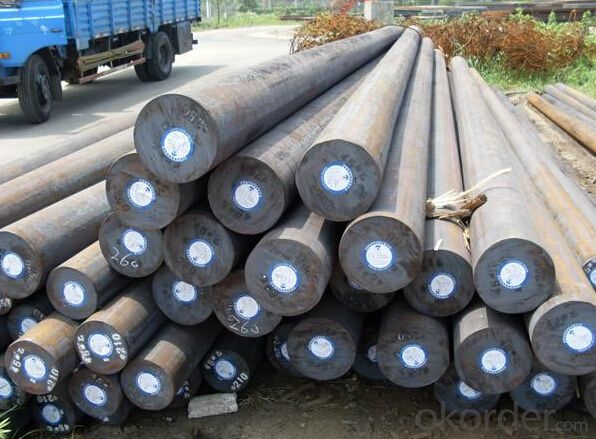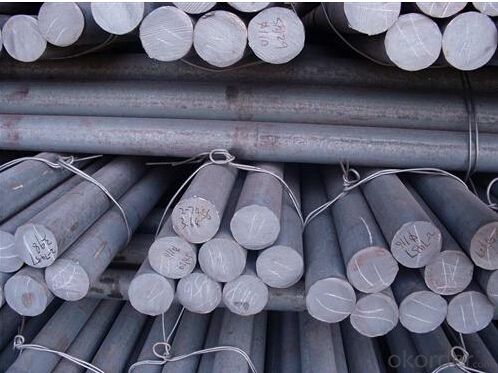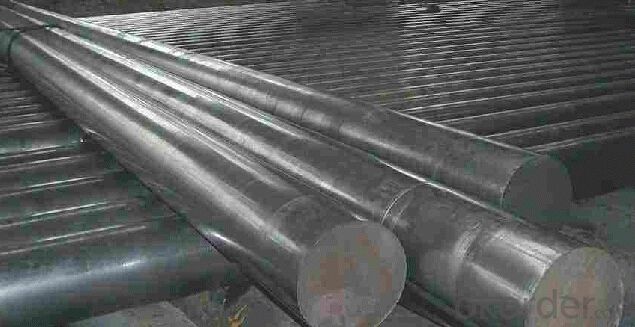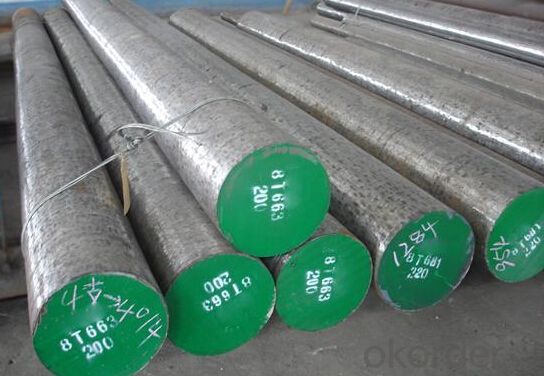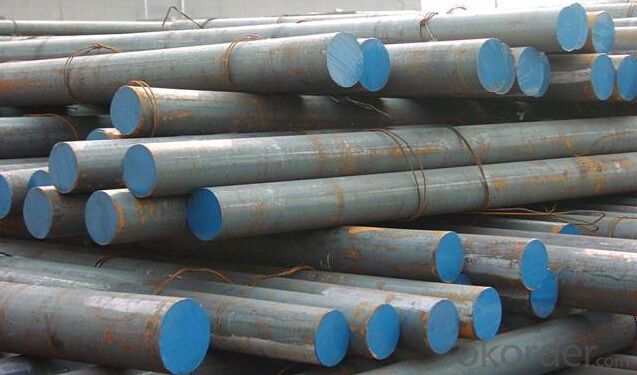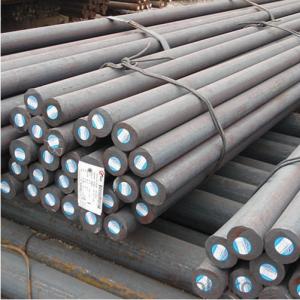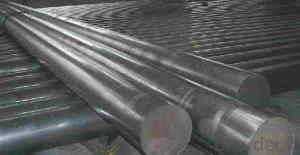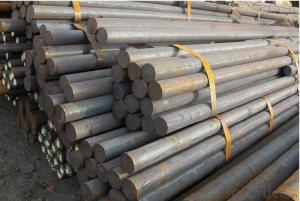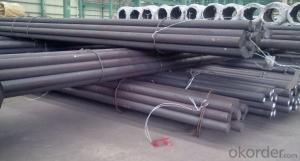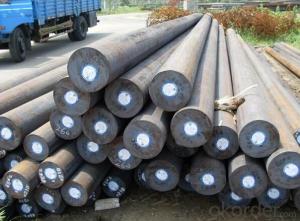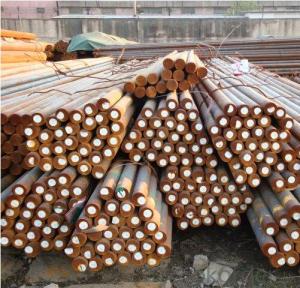Grade 12Cr1MoVG Alloy Steel / Tubular Steel Round Bar
- Loading Port:
- Shanghai
- Payment Terms:
- TT OR LC
- Min Order Qty:
- 3 m.t
- Supply Capability:
- 10000 m.t/month
OKorder Service Pledge
OKorder Financial Service
You Might Also Like
Specification
Specifications of Round Bar
1.hot rolled black surface
2. fine mechanical performance
3. Delivery condition: Hot-rolled,black surface.
4. AISI/ASTM 4140,42CrMo4 Din1.7225,SCM440 JIS
Chemical Composition
C | Si | Mn | P | S | Cr | Mo |
0.38-0.45 | ≤0.4 | 0.6-0.9 | ≤0.035 | ≤0.030 | 0.9-1.2 | 0.15-0.30 |
Our Featured Products
Alloy steel: Combination of steel / Bearing steel// Spring steel/ Cr- mo steel
GB 20Cr/ 40Cr / 42CrMo / 35CrMo/ 20CrMn/GCr15/30CrMnTi…
ASTM 5120 /5140 / 4140/ 4135/ 5152/52100…
JIS SCr420H/ SCr440/ SCM3/ SUP9/SUJ2…
Carbon steel: Carbon tool steel /Carbon Structural Steel
GB 20/ 35 /45/…
ASTM 1020/ 1030/1045…
JIS S20C/ S30C / S45C…
Usage and Applications of Round Bar
1. Chinese standard steel bar is often used where large amounts of steel need to be formed, for example as structural steel.
2. And we can use this kind of product on the performance of the mechanical parts if the demand is not very high.
3. Steel round bar is used in construction and a large number of architectural and engineering structures.
Packaging & Delivery of Round Bar
Packaging Detail: All goods are packed in bundle with steel strips and shipped by break bulk vessel or container (depend on target market and different ports)
Delivery Detail: 15~45 days
Trade terms: FOB, CFR, CIF
Weight: Theprice invoicing on theoretical weight basis or actual weight basis depends on customer’s request.
Shipment: The shipment of bulk break or container is depends on customer’s request and the situation of the port of destination.
Documents given: Full set of original clean on board bill of lading; Original signed commercial invoice; Original packing list; Policy of insurance; Certificate of origin and what the target market needs.
FAQ:
Q1: Why buy Materials & Equipment from OKorder.com?
A1: All products offered byOKorder.com are carefully selected from China's most reliable manufacturing enterprises. Through its ISO certifications, OKorder.com adheres to the highest standards and a commitment to supply chain safety and customer satisfaction.
Q2: How do we guarantee the quality of our products?
A2: We have established an advanced quality management system which conducts strict quality tests at every step, from raw materials to the final product. At the same time, we provide extensive follow-up service assurances as required.
Q3: How soon can we receive the product after purchase?
A3: Within three days of placing an order, we will begin production. The specific shipping date is dependent upon international and government factors, but is typically 7 to 10 workdays.
Q4: What makes stainless steel stainless?
A4: Stainless steel must contain at least 10.5 % chromium. It is this element that reacts with the oxygen in the air to form a complex chrome-oxide surface layer that is invisible but strong enough to prevent further oxygen from "staining" (rusting) the surface. Higher levels of chromium and the addition of other alloying elements such as nickel and molybdenum enhance this surface layer and improve the corrosion resistance of the stainless material.
Q5: Can stainless steel rust?
A5: Stainless does not "rust" as you think of regular steel rusting with a red oxide on the surface that flakes off. If you see red rust it is probably due to some iron particles that have contaminated the surface of the stainless steel and it is these iron particles that are rusting. Look at the source of the rusting and see if you can remove it from the surface.
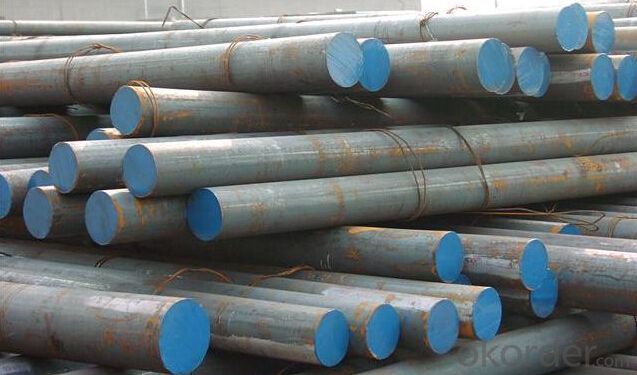
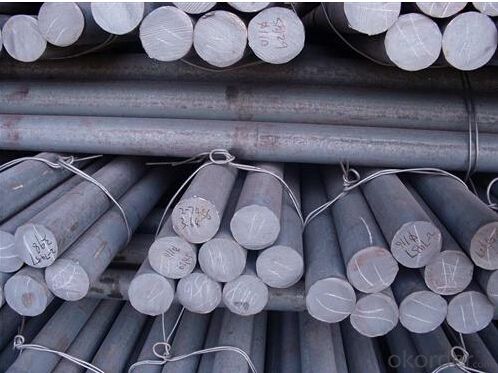
- Q: How does special steel perform in molding applications?
- Special steel performs exceptionally well in molding applications due to its unique properties. It possesses high strength, excellent wear resistance, and superior heat resistance, making it highly suitable for withstanding the demanding conditions of molding processes. Special steel also offers excellent dimensional stability, ensuring precise and accurate moldings. Furthermore, its corrosion resistance helps to prolong the lifespan of the molds, reducing maintenance costs. Overall, special steel enhances the performance and efficiency of molding applications, resulting in high-quality and durable products.
- Q: Is special steel suitable for manufacturing precision components?
- Manufacturing precision components can greatly benefit from the use of special steel. This type of steel is specifically designed to possess exceptional qualities such as high strength, hardness, and resistance to wear, corrosion, and heat. These outstanding characteristics make it the perfect choice for creating precision components that demand tight tolerances, accuracy, and reliability. The inherent strength and hardness of special steel enable the production of durable and long-lasting precision components. This is particularly crucial in industries where components are exposed to intense stress and heavy loads, such as aerospace, automotive, and machinery manufacturing. The wear and corrosion resistance of special steel ensures that the precision components can withstand harsh operating conditions and retain their functionality over extended periods of time. Moreover, special steel's remarkable heat resistance qualifies it for precision components that encounter elevated temperatures. This is especially significant in industries like aerospace and power generation, where components must endure extreme heat without compromising their performance. In addition, special steel offers excellent machinability, which is vital for manufacturing precision components with intricate designs and complex geometries. It can be easily shaped, cut, and formed into various sizes and shapes, enabling the production of intricate and precise components. Overall, the exceptional properties of special steel, including high strength, hardness, resistance to wear, corrosion, and heat, along with its superb machinability, make it highly suitable for manufacturing precision components. Its utilization guarantees the creation of high-quality components that adhere to the stringent requirements of precision applications.
- Q: What are the different types of welding techniques used for special steel?
- There are various types of welding techniques used for special steel, depending on the specific requirements and properties of the steel being used. Some of the common welding techniques for special steel include: 1. Shielded Metal Arc Welding (SMAW): Also known as stick welding, SMAW uses a consumable electrode coated in flux to create an electric arc between the electrode and the base metal. This technique is commonly used for thicker sections of special steel due to its high heat input and deep penetration. 2. Gas Metal Arc Welding (GMAW): Also known as MIG welding, GMAW uses a continuously fed wire electrode and a shielding gas to protect the weld from atmospheric contamination. This technique is versatile and widely used for special steel due to its ability to produce high-quality welds with good control. 3. Gas Tungsten Arc Welding (GTAW): Also known as TIG welding, GTAW uses a non-consumable tungsten electrode and a shielding gas to create an electric arc. This technique is often used for special steel alloys that require precise control over the welding process and where the weld quality and appearance are critical. 4. Flux-Cored Arc Welding (FCAW): Similar to GMAW, FCAW uses a continuously fed tubular electrode filled with flux. This technique is commonly used for special steel applications that require high deposition rates and deep penetration, such as in heavy fabrication or structural welding. 5. Submerged Arc Welding (SAW): SAW involves the formation of an arc between a continuously fed bare electrode and the workpiece, while a layer of granular flux covers the arc. This technique is typically used for heavy-duty applications and thick materials, providing high deposition rates and excellent weld quality. 6. Laser Beam Welding (LBW): LBW uses a highly focused laser beam to melt and join the special steel parts. This technique offers precise control, high welding speeds, and minimal distortion, making it suitable for specialized applications that demand high precision and minimal heat-affected zones. It is important to note that the selection of the appropriate welding technique for special steel depends on factors such as material composition, thickness, joint configuration, and desired weld properties. Proper knowledge and expertise are required to determine the best welding technique for a specific application to ensure optimal results in terms of weld quality, strength, and durability.
- Q: How does special steel contribute to the corrosion resistance of products?
- By incorporating specific alloying elements, special steel enhances its ability to withstand corrosion and contributes to the corrosion resistance of products. These alloying elements, such as chromium and nickel, create a protective layer known as a passive film on the steel's surface. This passive film acts as a barrier, preventing the penetration of oxygen and moisture to the underlying metal, thus reducing the chances of corrosion. Special steel contains high levels of chromium, which enables the formation of a dense and stable chromium oxide layer on the surface. This layer acts as a physical barrier, preventing the diffusion of corrosive agents and inhibiting rust formation. Additionally, the presence of nickel in the alloy further improves the steel's corrosion resistance by promoting the formation of a more uniform and adherent passive film. Furthermore, special steel can undergo specific treatments or processes to enhance its corrosion resistance. Techniques like heat treatment and surface coating can modify the steel's structure and composition, facilitating the formation of more stable passive films and reducing susceptibility to corrosion. These treatments also improve the steel's mechanical properties, making it more durable and resistant to external factors that may lead to corrosion. In conclusion, the utilization of special steel in various products enhances their resistance to corrosion through the incorporation of alloying elements and the application of specific treatments that encourage the formation of protective passive films. This, in turn, extends the lifespan of the products and ensures their performance and integrity, even in harsh and corrosive environments.
- Q: How does special steel contribute to the aerospace material weight reduction?
- Special steel contributes to aerospace material weight reduction by providing a lightweight yet strong and durable material option. Its unique properties, such as high strength-to-weight ratio and excellent corrosion resistance, allow for the construction of lighter aircraft components without compromising on safety or performance. This reduction in weight leads to improved fuel efficiency, increased payload capacity, and enhanced maneuverability, making special steel an essential element in aerospace industry's ongoing efforts to achieve greater fuel economy and sustainability.
- Q: How is stainless steel used in the food and beverage industry?
- Stainless steel is widely used in the food and beverage industry due to its excellent properties such as corrosion resistance, durability, and hygienic qualities. It is commonly used for manufacturing food processing equipment like tanks, pipes, and storage containers, as well as kitchen appliances and utensils. The non-reactive nature of stainless steel ensures that it does not impart any unwanted taste or odor to the food or beverage being processed or stored, making it a safe and ideal choice for maintaining product quality and safety standards.
- Q: What are the properties of high-speed tool steel?
- High-speed tool steel possesses excellent hardness, wear resistance, and high hot hardness, allowing it to withstand high temperatures and maintain its sharpness even when subjected to intense heat during cutting or shaping processes. It also exhibits good toughness and the ability to retain its cutting edge, making it suitable for various machining applications. Additionally, high-speed tool steel has good machinability, enabling it to be easily shaped and formed into desired tool designs.
- Q: Can special steel be used in the agricultural industry?
- Yes, special steel can be used in the agricultural industry. It offers various benefits such as high strength, durability, corrosion resistance, and the ability to withstand harsh environmental conditions. It can be used for manufacturing agricultural machinery and equipment like tractors, plows, harvesters, and irrigation systems, improving efficiency and productivity in the agricultural sector.
- Q: What are the properties of electrical resistance steel?
- Electrical resistance steel, also known as resistivity steel, possesses specific properties that make it suitable for various electrical applications. This type of steel has a high resistivity, meaning it resists the flow of electrical current more than other materials. It also exhibits low electrical conductivity, making it an ideal choice for applications that require insulation or the control of electrical current. Additionally, electrical resistance steel typically has good mechanical strength, corrosion resistance, and can withstand high temperatures, making it suitable for use in electrical resistors, heating elements, and other similar devices.
- Q: What are the different applications of stainless special steel?
- Stainless special steel, which is also known as stainless steel, is a highly versatile material that is used in various industries because of its unique properties. Some examples of the different ways in which stainless special steel is utilized include: 1. Construction: Stainless steel is widely employed in the construction industry due to its exceptional durability and resistance to corrosion. It is used in structural components, bridges, building facades, and roofing materials. 2. Automotive industry: The automotive sector extensively utilizes stainless steel because of its strength, ability to withstand high temperatures, and durability. It can be found in exhaust systems, mufflers, catalytic converters, fuel tanks, and various other components. 3. Medical equipment: Stainless steel is the preferred material in the medical field because of its high resistance to corrosion and biocompatibility. It is used in the production of surgical instruments, implants, orthopedic devices, and medical equipment. 4. Food processing industry: Stainless steel is widely employed in the food industry because of its hygienic properties. It is used in the manufacturing of food processing equipment, storage tanks, food preparation surfaces, and utensils. 5. Aerospace industry: Stainless steel is utilized in the aerospace industry for its strength, ability to withstand high temperatures, and resistance to corrosion. It is used in the production of aircraft parts, engine components, and structural elements. 6. Chemical industry: Stainless steel is highly resistant to corrosion from various chemicals, making it suitable for applications in the chemical industry. It is used in the manufacturing of tanks, pipes, valves, and other equipment that come into contact with corrosive substances. 7. Energy sector: Stainless steel is used in the energy industry for various purposes. It is employed in the construction of power plants, oil and gas refineries, pipelines, and renewable energy systems such as wind turbines and solar panels. 8. Marine industry: Stainless steel is extensively used in marine environments because of its excellent resistance to corrosion. It is used in the production of boat fittings, propellers, underwater structures, and offshore platforms. 9. Household appliances: Stainless steel is commonly used in household appliances because of its attractive appearance, durability, and resistance to stains and scratches. It can be found in kitchen appliances such as refrigerators, ovens, dishwashers, and washing machines. 10. Art and design: Stainless steel is increasingly being employed in art installations, sculptures, and architectural designs because of its aesthetic appeal, versatility, and ability to withstand outdoor conditions. In conclusion, stainless special steel is utilized in a wide range of industries due to its durability, resistance to corrosion, strength, ability to withstand high temperatures, and aesthetic appeal. It plays a crucial role in construction, automotive, medical, food processing, aerospace, chemical, energy, marine, household appliances, and artistic fields.
Send your message to us
Grade 12Cr1MoVG Alloy Steel / Tubular Steel Round Bar
- Loading Port:
- Shanghai
- Payment Terms:
- TT OR LC
- Min Order Qty:
- 3 m.t
- Supply Capability:
- 10000 m.t/month
OKorder Service Pledge
OKorder Financial Service
Similar products
Hot products
Hot Searches
Related keywords





